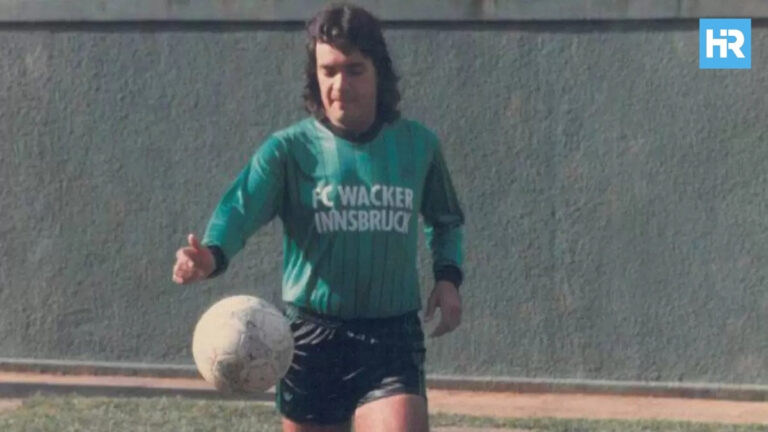
Carlos Henrique Raposo, known as Carlos Kaiser, had a 13-year football career. He signed contracts with some of the most well-known clubs in Brazil and abroad. However, what makes his story unique and shocking is that he never played a real game—not once.
Throughout his career, Kaiser managed to sign with clubs like Botafogo, Flamengo, Fluminense, Vasco da Gama, Bangu, and America in Brazil. He also signed with Puebla in Mexico, Ajaccio in France, and El Paso in the United States, though he never appeared in a single official match for any of these teams.
Instead of playing football, Kaiser used lies, fake injuries, personal connections, and charm to stay on teams’ rosters. His story is told in full in the 2018 documentary “Kaiser: The Greatest Footballer Never To Play Football,” directed by Louis Myles. In it, Kaiser explains how he managed to fool the football world for so long.
- Carlos Kaiser had a 13-year football career without playing a single match, fooling top clubs in Brazil and abroad.
- He used charm, fake injuries, and powerful connections to avoid playing while living like a celebrity athlete.
- His story reveals how charisma, media manipulation, and image can create fame—even without talent.
How Kaiser Got Signed Without Ever Playing
Kaiser built his image around a nickname. People called him “Kaiser” because of his supposed resemblance to the German football star Franz Beckenbauer, known as “Der Kaiser.” However, unlike Beckenbauer, Carlos had no real football skills. He couldn’t dribble, couldn’t shoot, and didn’t enjoy playing the sport.
Still, he found a way in. Early in his “career,” former Brazilian football captain Carlos Alberto Torres gave him a chance. Although Kaiser didn’t perform well and was released quickly, the opportunity gave him enough credibility to move from club to club. Each time, he would use his past contracts and fake stories to impress new teams.
At a time when people couldn’t easily check facts, Kaiser took full advantage. He paid journalists to write fake news stories about his successful stints with foreign clubs. These stories helped him get signed by teams who believed he had played abroad.
In training sessions, he often ran and stretched to look busy but avoided the ball. He would claim to be injured whenever coaches expected him to play. He sometimes paid young players to injure him on purpose so he could have an excuse to sit out. He also lied about family emergencies, such as the death of a grandmother, more than once.
Once, when doctors insisted on checking his condition, Kaiser used a fake medical report. He got help from a friend who was a dentist. He told the club president, “They found the problem—it’s dental,” even though it made no sense.
Despite all this, clubs, surprisingly, kept signing him. Part of the reason was his group of famous footballer friends, like Renato Gaúcho, Romário, Edmundo, and Ricardo Rocha. They often recommended him, giving his lies more weight.
The Fight That Earned Him a Contract Extension
The most well-known moment in Kaiser’s story took place while he was with Bangu, a club in Rio de Janeiro. The club was owned by Castor de Andrade, a well-known gangster and powerful figure in Brazilian football.
During one game, Kaiser was named as a substitute. When the coach told him to warm up and prepare to come on, Kaiser saw no way out. He knew he couldn’t play. So, he jumped over the fence and started a fight with fans in the crowd. The referee sent him off before he even stepped onto the pitch.
After the game, Castor entered the locker room, furious. Kaiser quickly made up a story. He told him, “God took my parents but gave me a father in you. They insulted you, so I lost control.” Castor, moved by the loyalty, didn’t punish him. Instead, he said, “Double his contract and extend it for six months.”
This is a prime example that goes to show how good Kaiser was at convincing people.
A Lifestyle Built Around Football, Without Football
Kaiser didn’t want to play football. He wanted the lifestyle. He openly said this in interviews. In 2018, he told The Sun, “I made sure I was seen with the greatest Brazilian footballers. Just being a football player made me a magnet for women.”
He admitted to being addicted to sex, comparing himself to actor Michael Douglas. He said he would sleep with at least three women every day and had been with more than 1,000 women over the years.
To keep the image alive, he showed women video clips of Renato Gaúcho scoring goals and claimed it was him. The trick worked because they looked similar, and people didn’t have smartphones or the internet to check the facts.
Kaiser also became known in the nightlife scene. He went out every night, even from Monday to Monday. He avoided early training sessions because he wasn’t in any condition to perform. Alternatively, he brought teammates to nightclubs, arranged parties, and sometimes even brought women back to their hotel rooms.
Because of all this, many of his teammates protected him. They didn’t care that he didn’t play. They liked having him around. He said, “Whenever a club president wanted to get rid of me, the players would get together and ask them not to because I brought a lot of value to the club. I bonded the group together.”
Fellow footballers backed this up. Brazilian striker Bebeto said, “His chat was so good that if you let him open his mouth, that would be it. He’d charm you. You couldn’t avoid it.”
The Footballer Who Became a Legend by Lying
Over his fake career, Carlos Kaiser signed with eleven different teams. He never scored a goal or played a full match, yet he managed to live like a professional footballer for nearly twenty years.
His success came from timing, appearance, and smooth talking. He built fake stories around his life and supported them with false media reports, help from friends, and a convincing attitude. In a time without the internet or social media, it was easy to create and maintain a fake reputation.
The 2018 documentary called “Kaiser: The Greatest Footballer Never To Play Football” tells his life story in depth. The film reveals how his experiences show human nature, the influence of image, and how easily people can be misled when they really want to believe in something.
In one scene, it is said that he kept pretending to be a player so well that the press, teammates, and fans accepted him as one of their own. He looked the part, talked the part, and lived the part. Only the ball was missing.
Now in his 60s, Carlos Kaiser works as a personal trainer for women. He no longer needs to fake injuries or avoid matches. He has fully stepped away from football, though his name remains famous—not for what he did on the field, but for how he avoided it altogether.
Kaiser once said, “I’m the greatest footballer who never played football.” Looking at the facts, it’s hard to disagree.









